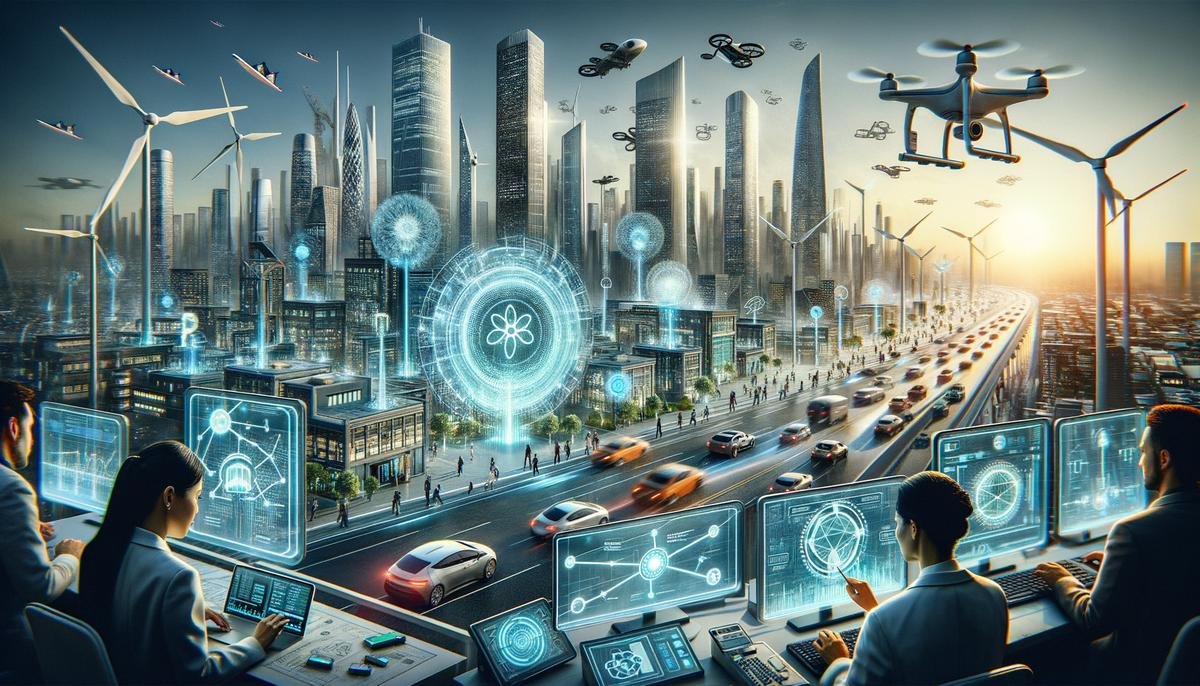Role of AI in Energy Efficiency
AI's role in energy efficiency is significant. Sensors gather data on room temperature, light levels, and occupancy, which AI uses to make real-time adjustments. This smart energy management turns raw data into decisions that reduce waste and costs.
In smart grids, AI predicts power needs and efficiently distributes electricity. Machine learning algorithms analyze historical data, weather forecasts, and current patterns to predict energy demand, ensuring a stable supply without overloading the system.
AI tools monitor grid stability, searching for potential faults to prevent blackouts. For energy storage, AI manages when to charge or discharge batteries, maximizing efficiency.
Even electric vehicles benefit from AI, which optimizes charging to avoid overwhelming the grid. In buildings, AI analyzes data from HVAC systems and lighting, adapting settings to current needs while conserving energy.
With AI in energy management, comfort remains high while bills and energy waste are reduced.

AI in Renewable Energy Integration
AI plays a crucial role in managing the variability of renewable energy sources like wind and solar power. It analyzes historical weather patterns and real-time data to forecast energy output with precision. This foresight allows grid operators to align resources effectively.
Beyond forecasting, AI optimizes grid operations by redirecting stored energy when renewable sources are less productive. This ensures a steady, reliable energy supply despite the intermittent nature of renewables.
By orchestrating these elements, AI bridges the gap left by fluctuations in renewable energy production, maintaining a consistent power supply and reducing costs.

Predictive Maintenance and AI
AI transforms maintenance from reactive to proactive by analyzing data to predict potential equipment failures. This approach creates a clear maintenance schedule that reduces costs and downtime.
In manufacturing, companies like Siemens use AI to monitor machine vibrations, temperatures, and operational feedback, preventing breakdowns before they occur. The oil and gas sector benefits from AI-powered predictive maintenance, aligning necessary adjustments with planned downtimes to maintain workflow.
In the nuclear power industry, utility companies use AI to monitor reactors, ensuring safety and efficiency by predicting sensor calibrations and preventing unexpected shutdowns.
AI's predictive maintenance capabilities allow organizations to focus on their core operations, confident in the reliability of their energy systems.

Challenges and Limitations of AI in Energy
Despite its benefits, AI in energy management faces challenges. Data privacy is a primary concern, as AI systems require vast amounts of potentially sensitive information. Implementing robust encryption and data anonymization techniques can address these issues.
High implementation costs present another obstacle. The initial investment for AI integration can be substantial, but demonstrating long-term savings and exploring partnerships or grants can help overcome this hurdle.
Integration obstacles arise when introducing AI to existing systems. Incremental integration and clear strategies promoting compatibility can ease this transition. Partnering with tech-savvy consultants can ensure a smooth merger of new and existing technologies.
Addressing these challenges requires caution and expertise but can lead to innovative solutions and a more efficient AI-driven energy future.

Future Trends in AI Energy Management
The future of AI in energy management involves integration with the Internet of Things (IoT) and blockchain technology. IoT creates a network of devices that coordinate energy usage efficiently, while blockchain enhances the security and transparency of energy transactions.
Advancements in machine learning and artificial neural networks are improving AI's decision-making abilities, potentially leading to self-learning systems that optimize energy consumption and predict maintenance needs with minimal human oversight.
Policy shifts and regulatory changes are driving this technological transformation. Governments are implementing policies that incentivize sustainable practices and AI integration in energy systems, providing a framework for innovation in the sector.
These developments promise to redefine energy management, making energy efficiency more achievable and sustainable.

AI is reshaping energy management, turning challenges into opportunities for innovation. By blending technology with sustainability, it promises a future where energy efficiency is more than just a goal—it's a reality.
- World Economic Forum. The impact of artificial intelligence on energy consumption. 2023.
- Stanford University. AI for Good Specialization. Coursera. 2023.
- Siemens Energy. Digital twin technologies for energy asset performance. 2022.
- International Energy Agency. The role of artificial intelligence and machine learning in the clean energy transition. 2021.



